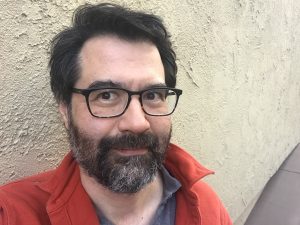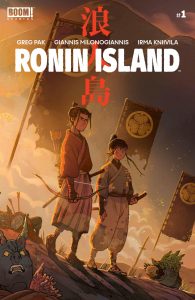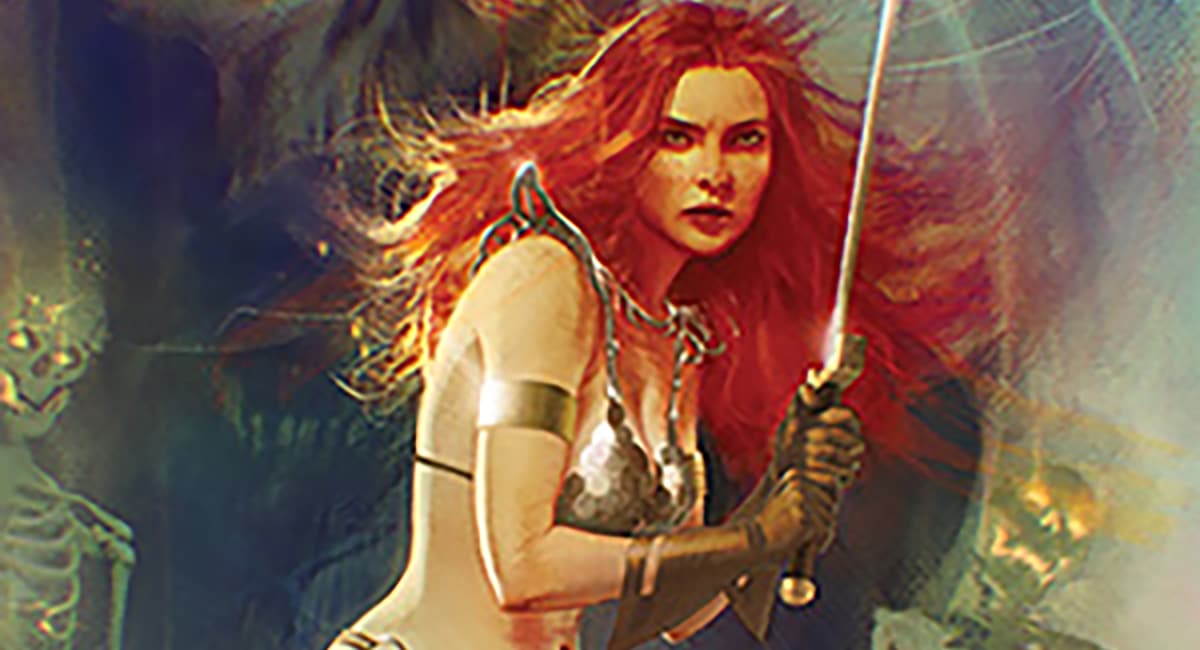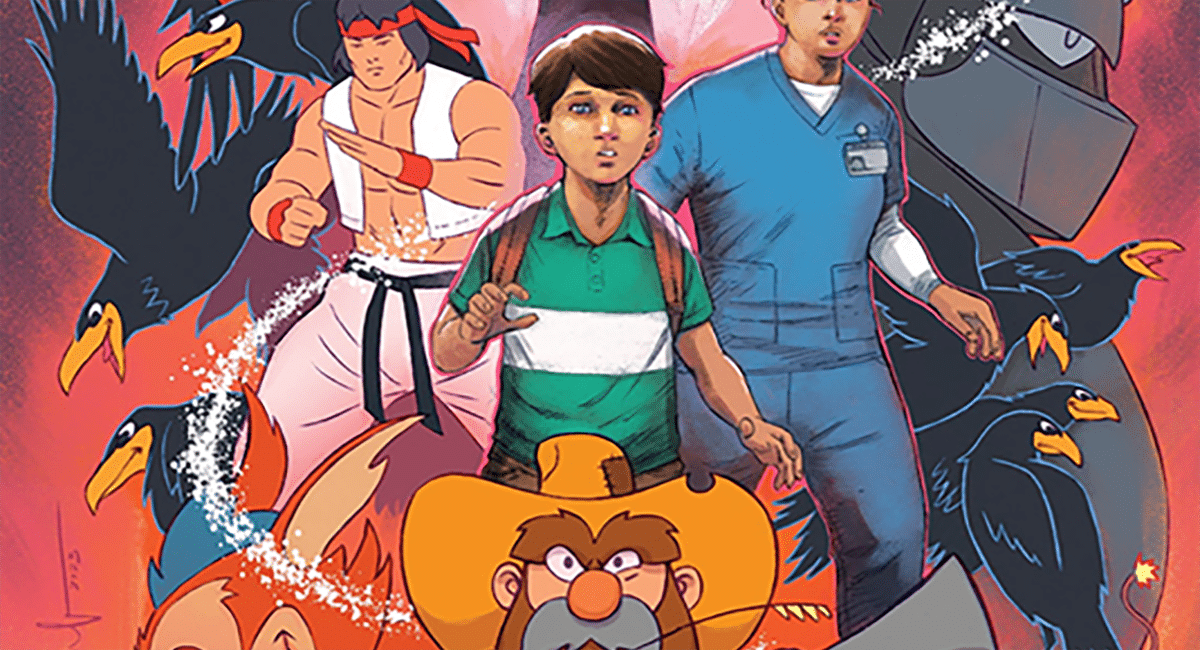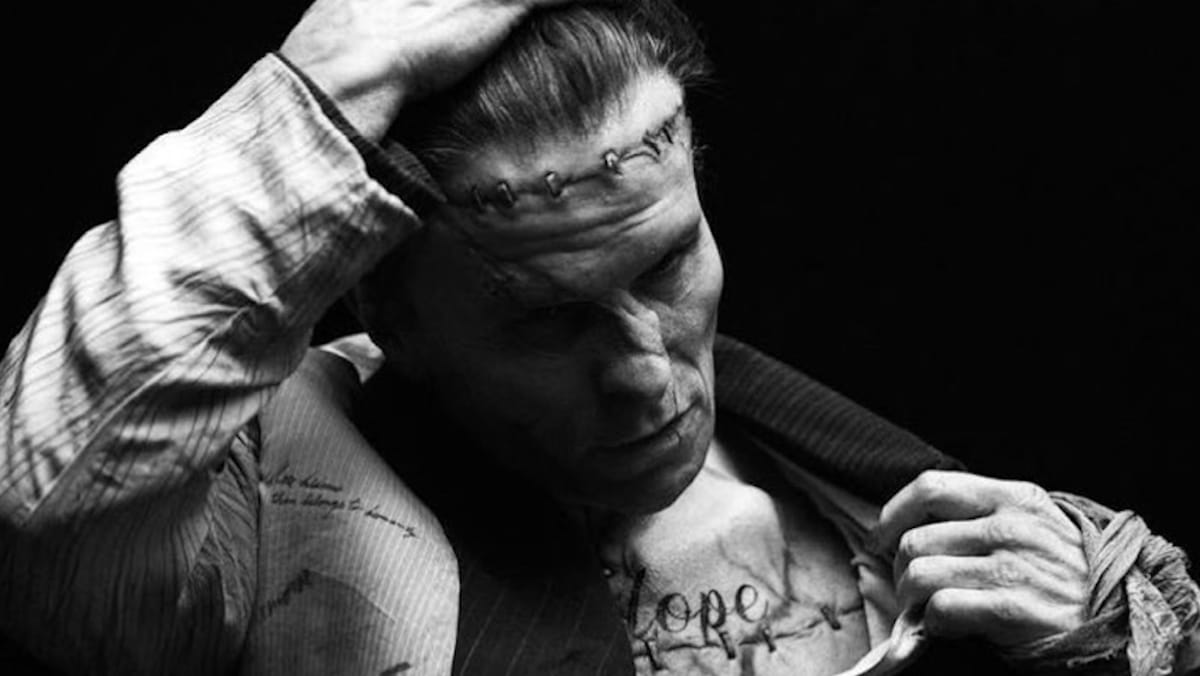By Nancy Powell
Greg Pak has a long history in comics as the writer of several popular Marvel and DC titles, including X-Treme X-Men, Hulk, Batman/Superman, and Action Comics. In recent years, Pak has shifted his attention back to his “Asian Pride” roots with Mech Cadet Yu and Ronin Island. The Beat caught up with Pak to talk about current and upcoming projects.
Nancy Powell: Let’s talk about your new series, Ronin Island. The first issue left readers with a total cliffhanger. Could you give as a hint as to what we can expect in later issues?
Greg Pak: Yeah, so our young heroes, Hana and Kenichi, are going to end up having to take on this new threat. They live in this alternate 19th century Japan. A terrible crisis has wrecked wide swaths of the whole region. And the survivors for a generation and a half have been living on this island. Survivors from Japan, Korea and China form this society where everybody from many different backgrounds come together in order to survive.
But now a new threat has come. General Saito claims to be sent by the new Shogun. Also there’s this strange threat of these horrific zombie-like creatures, so Hana and KenIchi are going join with General Saito. They have to come together to you know to defend the island. But also in this time of crisis, this island community thinks of itself as being very democratic and egalitarian, but these class divisions still remain. Kenichi is the son of the Samurai co-founder of the island, and Hana is a Korean orphan who lives in a shack by the sea. So there are these that these class divisions within the island even though the island kind of pretends there aren’t. And we’ll see whether that gets exacerbated or whether they come together in spite of that as this crisis gets more severe.
Powell: Some of this story seems based on historical elements. When you develop a script like this, how much historical research do you have to do?
Pak: Well we cut ourselves a little bit of slack because it’s an alternate history, right? So we aren’t dealing with actual historical events. Over the years I’ve read and studied a lot about Japan and about this time period. Throughout this we’ve been doing a lot of research just to try to get the look and feel of the whole thing. I mean we still have to know what the deal was in order to know what we’re deviating from. Some of that’s not yet totally apparent. It’ll be revealed more as we go along.
Powell: Let’s talk about Mech Cadet Yu. You’ve written about a relationship that I kind of find intriguing because it’s a little bit too familiar…the relationship between Dolly and her son, Stanford.
Pak: I love it when characters have families, particularly young characters. The family element is such a big deal for kids. In a big adventure story, having a having a mom who is present just felt like a really fun detail to play with. Also because Stanford’s got a working class family. He’s been thrust into this world of kids who are in this military academy, elite kids from families with a military background. And Stanford’s mom’s janitor. I felt it was important to understand where where Stanford comes from in order to understand what this new life is for him. And I just loved Dolly. As the story goes on she’s very protective of Stanford, but she’s also kind of a kick-ass mom. At the same time she doesn’t want her kid to be a hero because that’s dangerous. But when push comes to shove, she wants her kid to be a hero. I mean she’s proud of him you for standing up for what’s right, and that kind of complicated dynamic just felt true and fun.
Powell: I’m assuming you’re part Asian.
Pak: Yeah, I’m biracial. My father’s Korean and my mom’s white.
Powell: So did you experience any of this dynamic growing up?
Pak: [laughing] I didn’t write this based on any person in my life. I’ve known a lot of Asian moms and Asian dads, and so I’ve seen a lot of different dynamics play out. Maybe this is similar to some of those, but that combination of protectiveness and yet high expectation…those two things together is something a lot of people can relate to. I mean not just Asian people, but in this specifically Asian-American way. I think a lot of people kind of resonate with it..
Powell: Have any Asian readers commented about this?
Pak: Oh yeah, yeah, yeah. Actually somebody wrote a whole article about celebrating the Asian mom. Dolly was a significant figure in the book, and they liked it. You know that it resonated to see Asian-American moms represented in this way.
Also, I’ve written lots of heroes who were orphans. And that’s a very common thing from Disney to Marvel. Harry Potter’s an orphan. Half the X-Men are orphans. It’s a very common thing. And sometimes that’s exactly the right kind of story to tell. But I think there’s something really resonant about just getting people’s parents in the mix. You know when your parents show up, you can’t hide it. All of this stuff that you’re trying to pretend you are, that goes out the window and your mom’s right there talking about you to your face and in front of all your friends. That kind of dynamic is just really fun and a great way to dramatize where a person is from and also what matters to them, and again, I emphasize particularly for these young characters.
I happened to be in elementary school a while ago and they had this thing on the wall where kids were supposed to write down what makes them the happiest. And they drew little pictures of when I’m at the baseball game with my dad or when my mom reads me a book. They were all about their parents. I mean they’re just adorable little drawings, little stick figure kids and parents snuggling, playing in the park or whatever. That’s just a fact of life for most people. At a certain point in your lives your parents really are the most present and important people. And if they’re not, oftentimes people long for that. So for these young characters, they’re getting away from their parents, but that’s the parents are still so important. It’s fun to be able to include them.
Powell: In your experience writing these types of books and in writing a superhero comic such as Superman or Hulk, is the creative process in how you approach a script different?
Pak: Actually, it’s all the same. We’re here WonderCon, and I kind of stepped back and looked at all the stuff on my artist alley table. I’ve got like this kid’s book, The Princess Who Saved Herself, and it’s right next to a middle-age book about a Hawk-Wolverine hybrid. They’re totally different, but at the same time it’s the same process. I’m trying to figure out what makes a character tick, the best way to dramatize their story, how they’re different. At the end of the story from the way they were at the beginning and what that journey is all about. In the end what they’re trying to do, what they think they want to do with what they really want to do–I mean, it’s the same process. It’s kind of a trip. Of course there’s differences in details, there’s things that Hulkverine will do that even Stanford won’t do. Figuring out what that story is and how to do it is the same thing.
Most of these characters are on some level trying to do the right thing. They’re going to screw it up from time to time to make more mistakes. They’re going to struggle with that journey, but they’re really trying to figure out how to do the right thing in a complicated world.
Powell: You’ve been here all three days of WonderCon. What is the best thing you’ve experienced so far?
Pak: Oh wow! You know, there’s a lot. Every time somebody comes up to my table and talks about a book that meant something to them, it’s incredible. I just write these things and get them out there, try to do my best and when you’re making comments on books you’re working with your collaborators on, these dark little dungeons, and then you send it out. You just hope it resonates with people and when it actually does it is the greatest thing ever. Seeing happy people who have enjoyed the books…that’s everything. I’m also having the chance to hang out with know fellow comics makers and folks, and hear what they’re doing. That’s always it’s always a blast.
I know comics is this incredibly collaborative process in the sense that we’re all working in teams and and we totally depend on each other, but almost 95 to 98 percent of it is done remotely. I’m on a separate little work space, shooting e-mails, sending each other scripts and art and stuff. So it’s a special thing to be able to see people face-to-face and hang out and commiserate sometimes.
Powell: And the least favorite part of your experience so far?
Pak: I’m kind of tired [chuckling]. I’m kind of tired. I’ve been doing a good job. I’ve been sleeping. I haven’t been doing crazy stuff. I’ve been staying up late. I try to sit and be at my table as much as I possibly can. I’ve got I’ve got panels here and there. If I’m not at a panel I really try to be at that table because there are people who are only at the con for a day and it’s a bummer if I’ll come back to your city and they’ll say, “I missed you last time. I came by your table three times. You were there.” I’m sorry. So I really try to be there. It’s tiring to spend nine to ten at that table during the course of a long day. I mean it’s awesome. I’m not complaining.
I’m jealous of the artists who can come out here with one portfolio. I’d like do commissions and sell prints because as a writer I got I’m lugging books.I just shipped all these books and I’m over here grappling with a lot of physical objects. The worst thing is managing that slight anxiety about how much stock I’m gonna have to take back and how heavy my suitcases are going to be when I get to the airport in terms of suitcase weight. But those are small potatoes complaints. The experience is amazing. I’m thrilled to be here.
Powell: Can you talk about some of the projects you have in the works?
Pak: Yes! I’ve got a few big things that I’m really excited about. There’s a new Agents of Atlas book that’s coming, and it’s going to team up on Amadeus Cho and Jimmy Woo and Silk, and the rest of the characters who are in that totally awesome Hawk Asian-American superhero team up we did. I’ve been wanting to do more of those characters forever, and so they’re going to be teaming up with a bunch of heroes from Asia.
In recent years Marvel has collaborated with different writers and artists from Asia and developed characters that have debuted overseas. There are these two characters from China–Sword Master and Aero–who were created by these Chinese creators, and they’ve been appearing in digital comics in China. And so now in this War of the Realms New Agents of Atlas book they’re going to debut for the first time in English language Marvel comics, as well as some Korean characters who were created for the four Marvel games. And we’re creating a brand new Filipino character in conjunction with Leinil Francis Yu, a great Marvel artist who also happens to be Filipino, because it’s been a while since we’ve had a Filipino superhero in the Marvel Universe. Her name is Wave.
We just announced the other day that Wave will be appearing in the new Aero book. These two Chinese superheroes are going to be translated into English and published in the U.S. in books called Aero and Sword Master. And then I’m writing stories for those books. It’s gonna be a big fat book with Aero and Wave. Co-starring in The Sword Master book will be Shang Chi, Master of Kung Fu, teaming up with the sword master. So it’s a lot of fun. And so there’s three different places you can be able to see more Asian and Asian-American characters in the Marvel Universe. I’m pretty excited about it.
And then the other big news is that Ronin Island has been upgraded from a five issue mini to 12 issues. We’re getting a whole order because people really supported it, and we’ve got more story to tell. So we’re really excited about it.
Home Interviews INTERVIEW: At Wondercon '19, Greg Pak Explores Class Divisions and Family Dynamics...


